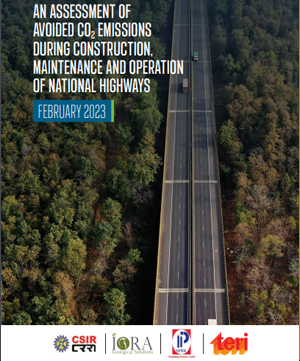An Assessment of Avoided CO2 Emissions during Construction, Maintenance and Operation of National Highways
India has the 2nd largest road network in the world. Amongst the different types of roads, the National Highways extending to 1,44,634 km has contributed significantly to India’s rapid economic development. The rapid pace of construction of highways is enabling integration of the local economies of far flung towns and villages into the national economy.
Construction and maintenance of roads is known to be a source of CO2, which is over and above the CO2 emitted from fuel operated vehicles on roads. In 2016, about 243 million tonnes of CO2 was emitted from the operation of fossil fuel run vehicles in India, which is 10.8% of the total national CO2 emissions. The new and improved state of the art National Highways replacing congested and often circuitous routes, however, can help avoid CO2 emissions by reducing fuel combustion in vehicles plying on them. The avenue plantations and compensatory afforestation’s (CA) can additionally sequester CO2, thus adding to the offset of CO2 emitted from highway operations as a whole.
Keeping India’s climate commitments and goals in mind against the backdrop of highways as enablers of development, a rapid assessment was carried on 20 National Highways pan-India to quantify the potential emissions of CO2 per km that can be avoided by the National Highway operations. Using existing data available with the National Highways Authority of India (NHAI) and in consultation with experts from Ministry of Environment, Forest and Climate Change (MoEFCC), the report has been jointly prepared by CSIR-Central Road Research Institute (“CSIR-CRRI”), CSIR-Indian Institute of Petroleum (“CSIR-IIP”), IORA Ecological Solutions (“IORA), and The Energy and Resources Institute (“TERI”).
The detailed guidance of estimating tonnes of CO2 avoided per km of National Highways presented in this report can form the basis for tracking CO2 emitted or avoided due to these activities. For the per km CO2 avoided estimates to be more scientifically rigorous, systematic collation of observations post construction of National Highways is suggested to be carried out and made available along with pre-construction data contained in the relevant Environment Impact Assessment Reports (EIAs) and Detailed Project Reports (DPRs).
Further, to continuously enhance avoidance of CO2 emissions from this sector, it is suggested to develop commensurate standard decision tree based location specific SOPs that would integrate the best available green technologies in the entire cycle of National Highways construction, maintenance and operations.

